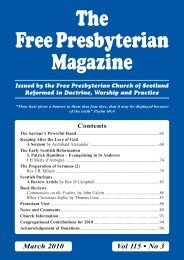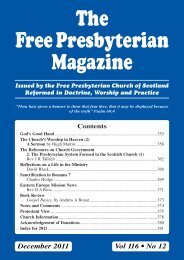April - the Free Presbyterian church of Scotland
April - the Free Presbyterian church of Scotland
April - the Free Presbyterian church of Scotland
You also want an ePaper? Increase the reach of your titles
YUMPU automatically turns print PDFs into web optimized ePapers that Google loves.
Benefits <strong>of</strong> <strong>the</strong> Reformation to <strong>Scotland</strong> 111have been impeded, <strong>the</strong>y were not at all prevented in <strong>the</strong>ir endeavours; <strong>the</strong>yestablished a commendable system <strong>of</strong> poor relief on a scale virtually unknownelsewhere in Europe that continued until <strong>the</strong> mid-nineteenth century.W Stanford Reid remarks that <strong>the</strong> Church <strong>of</strong> <strong>Scotland</strong> was able “through itscare <strong>of</strong> <strong>the</strong> poor and control <strong>of</strong> education to exert a powerful influence uponsociety as a whole”. 18Conclusion. Margo Todd uses <strong>the</strong> phrase, “a Puritan nation”, to describe <strong>the</strong>“pr<strong>of</strong>ound cultural change” wrought by <strong>the</strong> Reformation in <strong>Scotland</strong> characterisedby “abstemious self-restraint, sober but affective piety, unrelentingsabbatarianism, highly visible and rigorous social discipline”. 19 We may welluse <strong>the</strong> words <strong>of</strong> George Gillespie: “The Church <strong>of</strong> <strong>Scotland</strong> was blessed witha more glorious and perfect reformation than any <strong>of</strong> our neighbour Churches”.20 This describes accurately, not only <strong>the</strong> degree to which <strong>the</strong> doctrineand worship established were in conformity to <strong>the</strong> Word <strong>of</strong> God, but equallymatters <strong>of</strong> reformation in practice.As we reflect upon this history we see <strong>the</strong> light <strong>of</strong> <strong>the</strong> gospel breakingforth in <strong>Scotland</strong> and coming to a glorious dawn at <strong>the</strong> Reformation and <strong>the</strong>nrising to a high noon <strong>of</strong> maturity and purity in 1596, <strong>the</strong> climax <strong>of</strong> Reformationstrength. Just as quickly, however, clouds <strong>of</strong> persecution and corruption initiatedby royal authority ga<strong>the</strong>red with increasing solemnity upon <strong>the</strong> Churchuntil <strong>the</strong>y were wonderfully dispersed by <strong>the</strong> full strength <strong>of</strong> <strong>the</strong> revival <strong>of</strong>Covenanted reformation in 1638. The glory <strong>of</strong> this time passed into <strong>the</strong> darkestthunderclouds yet seen, as <strong>the</strong> blood <strong>of</strong> <strong>the</strong> martyrs was freely shed in <strong>Scotland</strong>.When all seemed darkest, <strong>the</strong> Lord “shot out lightnings, and discomfited<strong>the</strong>m” (Ps 18:14) and restored to <strong>Scotland</strong> its <strong>Presbyterian</strong> Church.The “cloudy and dark day” <strong>of</strong> Moderatism had <strong>the</strong>n to be broken throughby <strong>the</strong> radiant reviving work <strong>of</strong> God, which paved <strong>the</strong> way for a necessaryDisruption from a vitiated state establishment. The sun was soon setting in<strong>Scotland</strong>, however, as men saw with grief <strong>the</strong> darkness <strong>of</strong> rationalism andapostasy stealing in upon <strong>the</strong>m. In 1893 <strong>the</strong>re were a few faithful witnesseswho were willing to preserve what remained <strong>of</strong> <strong>the</strong> light, while that sun wentdown. Their children beheld something <strong>of</strong> <strong>the</strong> glow <strong>of</strong> better days sinkingbelow <strong>the</strong> horizon. But we are here in this generation and it is night: <strong>the</strong>deepening darkness is one that can be felt.As we look back upon a rich heritage, our condition may be described in18 Trumpeter <strong>of</strong> God: a Biography <strong>of</strong> John Knox, Charles Scribner’s Sons, New York, 1974,p 289.19 Todd, The Culture <strong>of</strong> Protestantism in Early Modern <strong>Scotland</strong>, p 402.20 Dispute Against <strong>the</strong> English Popish Ceremonies Obtruded upon <strong>the</strong> Church <strong>of</strong> <strong>Scotland</strong>,Edinburgh, 1844, p v.
















